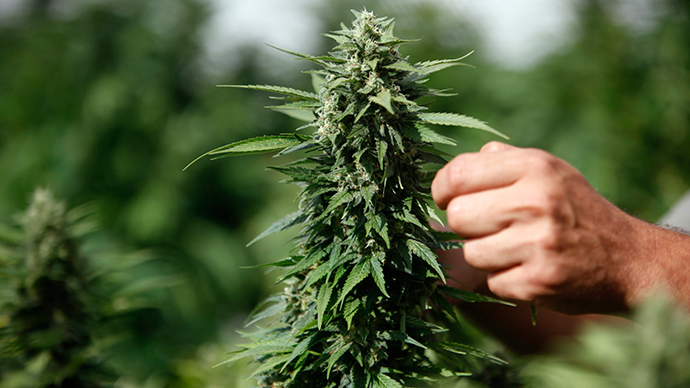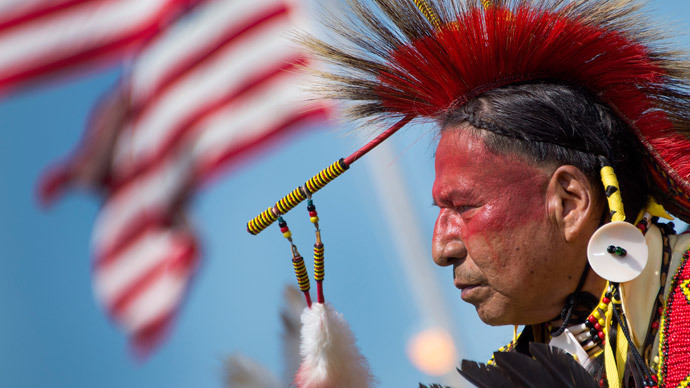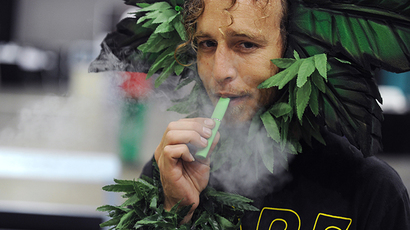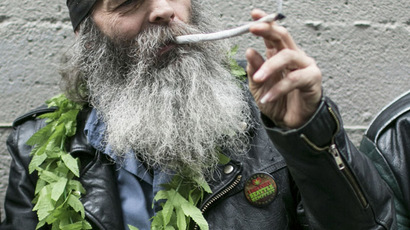Federal govt to allow Native Americans to grow marijuana on tribal lands

The US government will not stop Native American tribes from growing marijuana on tribal lands, nor will it enforce federal pot laws on the groups, according to a recently released Department of Justice memo.
READ MORE:Native Americans fight to ban marijuana in a quarter of Washington state
“With a number of states legalizing marijuana for use and production, some tribes have requested guidance on the enforcement of the Controlled Substance Act (CSA) on tribal lands by the United States Attorneys' offices,”the memo begins.
The directive outlines eight federal law enforcement priorities wherein the DOJ “will focus its limited investigative and prosecutorial resources in all states.”
Federal attorneys should target keeping pot away from minors; thwarting criminal enterprises like gangs and drug cartels from profiting off marijuana sales; preventing the transportation of cannabis out of states where it has been legalized; barring legal marijuana activity from acting as a cover for illegal actions, as well as the use of firearms during those legitimate activities; targeting drugged driving and other adverse public health consequences; preventing marijuana from being cultivated on public lands and federal property, even in states where the crop is legal.
Regarding Native American lands, the memo says the Justice Department “requires consultation with our tribal partners in the districts and flexibility to confront the particular, yet sometimes divergent, public safety issues that can exist on any single reservation.”
READ MORE:Congress to block marijuana legalization in DC
The directive, entitled the 'Cole Memorandum,' says that federal prosecutors should consult with each tribe “on a government-to-government” basis when evaluating marijuana enforcement activities on native lands. The guidance will be implemented on a case-by-case basis and tribes must still follow federal guidelines, Timothy Purdon, the US attorney for North Dakota and the chairman of the Attorney General's Subcommittee on Native American Issues, told the Los Angeles Times.

But just because the tribes could turn marijuana cultivation into a cash cow ‒ like many have done with casinos ‒ doesn’t mean they will. Native American reservations have high rates of alcoholism, with the Centers for Disease Control and Prevention listing alcohol use as an important health issue that disproportionately affects some Native subgroups. The CDC also lists chronic liver disease and cirrhosis as the fifth leading cause of death.
A 2011 survey published in JAMA Psychiatry found that 15 percent of Native American adolescents aged 12 to 17 suffer from a drug abuse disorder, compared to 7.9 percent of the entire adolescent population.
"Native Americans and their families suffer disproportionately from addiction compared to other groups," Kevin Sabet, head of the anti-legalization project Smart Approaches to Marijuana, told the LA Times. "The last thing they want is another commercialized industry that targets them for greater use."
He called the policy an "extremely troubling development" that “once again sends a message that we really don't care about federal drug laws."
The federal government will continue to legally support those tribes that wish to ban marijuana, even in states that now permit its sale, while remaining on the sidelines for those federally recognized tribes that choose to allow it, Purdon said.
"The tribes have the sovereign right to set the code on their reservations," he noted.
“Having the Department of Justice take a stance honoring the sovereignty of Native American tribes when it comes to how they set their own marijuana policy is refreshing,” NORML Communications Director Erik Altieri told Marijuana.com in an email. “The individuals living on these reservations deserve the same freedom to decide how they chose to handle marijuana on their own lands as we are currently providing the fifty states under current Justice Department memos.”

READ MORE:Native American youth in 'national crisis' - White House
Mason Tvert, a spokesman for the pro-legalization Marijuana Policy Project, said that tribal leaders “will have a tremendous opportunity to improve public health and safety, as well as benefit economically” by legalizing marijuana.
“Regulating and taxing marijuana like alcohol would ensure the product is controlled, and it would bring significant revenue and new jobs to these communities,” he told US News & World Report.
“Studies have consistently found above-average rates of alcohol abuse and related problems among Native American communities, so it would be incredibly beneficial to provide adults with a safer recreational alternative," he added.
There are 326 federally recognized Native American reservations, according to the Bureau of Indian Affairs.
The memo, which was published Thursday but dated October 28, comes as Congress “appears poised to send a bill to President Obama that would ban the Department of Justice from meddling with state medical marijuana laws,” VICE reported. At the same time, however, the Republican-led US House is using a crucial spending bill in an effort to block the legalization of recreational marijuana in Washington, DC, where a ballot initiative passed last month with nearly 70 percent voter approval.














